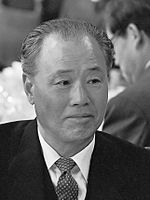Zhao Ziyang, Date of Birth, Place of Birth, Date of Death
TweetZhao Ziyang
former General Secretary of the Communist Party of ChinaAbout Zhao Ziyang
- Zhao Ziyang (pronounced [??âu ts??`.ja?] or Chao Tzu-yang; born Zhao Xiuye, 17 October 1919 – 17 January 2005) was a high-ranking statesman in the People's Republic of China (PRC).
- He was the third Premier of the People's Republic of China from 1980 to 1987, Vice Chairman of the Communist Party of China from 1981 to 1982, and General Secretary of the Communist Party of China from 1987 to 1989.
- He lost power in connection with the reformative neoauthoritarianism current and his support of the Tiananmen Square protests of 1989. As a senior government official, Zhao was critical of Maoist policies and instrumental in implementing free-market reforms, first in Sichuan and subsequently nationwide.
- He emerged on the national scene due to support from Deng Xiaoping after the Cultural Revolution.
- An advocate of the privatization of state-owned enterprises, the separation of the party and the state, and general market economic reforms, he sought measures to streamline China's bureaucracy and fight corruption, issues that challenged the party's legitimacy in the 1980s.
- Many of these views were shared by the then General Secretary Hu Yaobang.His economic reform policies and sympathies with student demonstrators during the Tiananmen Square protests of 1989 placed him at odds with some members of the party leadership, including Chairman of the Central Advisory Commission Chen Yun, Chairman of the CPPCC Li Xiannian and Premier Li Peng.
- Zhao also began to lose favor with Chairman of the Central Military Commission Deng Xiaoping.
- In the aftermath of the events, Zhao was purged politically and effectively placed under house arrest for the rest of his life. He died from a stroke in Beijing in January 2005.
- Because of his political fall from grace, he was not given the funeral rites generally accorded to senior Chinese officials.
- His secret autobiography was smuggled out and published in English and in Chinese in 2009, but the details of his life remain censored in China.
Read more at Wikipedia


 Date of Birth:
Date of Birth:  Place of Birth: Hua County, Henan, China
Place of Birth: Hua County, Henan, China